Futurism, transhumanism, bioethics, ethics, science, philosophy, artificial intelligence, personhood.


And Patreon: https://www.patreon.com/nikitapetrov.
3:45 Does Russian thought have anything to contribute to the world?
15:30 Nikolay Fedorov, an eccentric thinker who influenced Tolstoy and Dostoyevsky.
24:17 Fedorov’s plan: Immortality for everyone.
31:48 ‘Kinship’ as a fundamental property of all matter.
45:13 A mass movement for the spiritual unity of humankind.
01:13:09 Vladimir Solovyov’s The Meaning of Love: Sexuality as a path to a Christian utopia.
01:36:27 Christ as the ultimate role model.
Watch this conversation on MeaningofLife.tv: http://meaningoflife.tv/videos/37671
Nikita Petrov (MeaningofLife.tv) and George Young (University of New England, The Russian Cosmists)
Recorded on December 7, 2016.
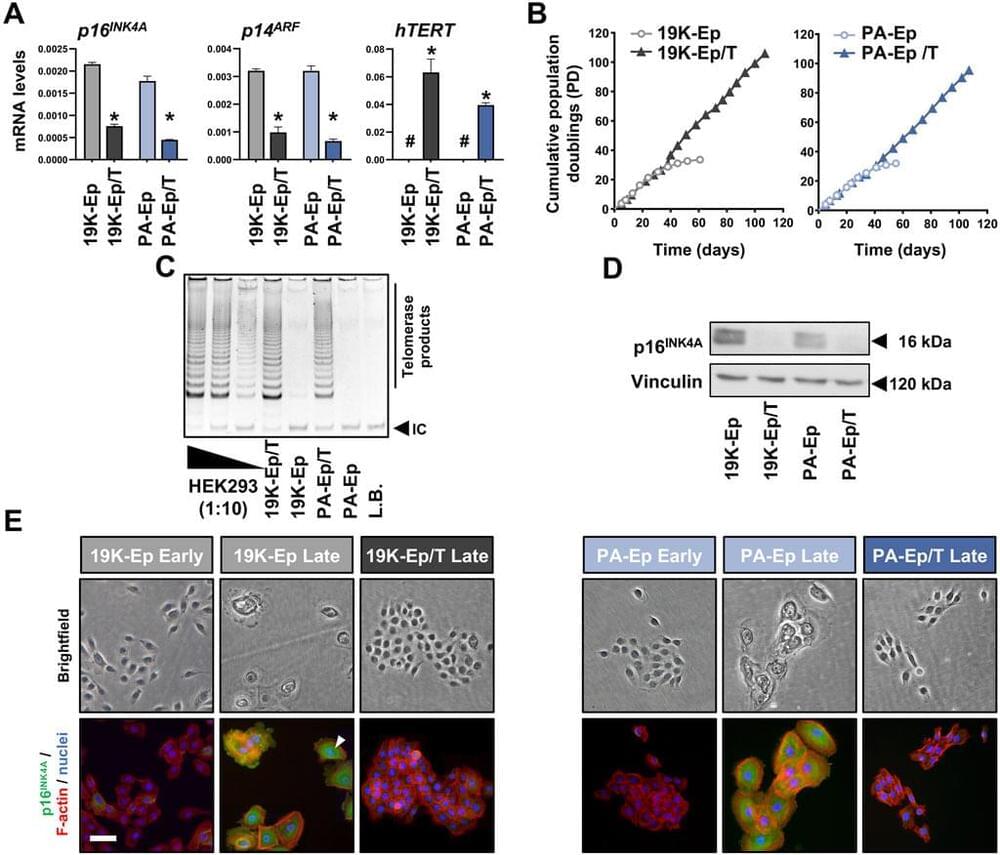
Introduction: The lips fulfill various critical physiological roles besides being viewed as a fundamental aesthetic feature contributing to the perception of health and beauty. Therefore, any lip injury, abnormality, or congenital malformation, such as cleft lip, needs special attention in order to restore proper lip function and aesthetics. To achieve this goal, a better understanding of the complex lip anatomy, function, and biology is required, which can only be provided by basic research endeavors. However, the current lack of clinically relevant human lip cells and three-dimensional in vitro lip models, capable of replacing ethically questionable animal experimentations, represents a significant limitation in this area of research.
Methods: To address these limitations, we aimed to pioneer the introduction of immortalized healthy lip-and cleft lip-derived keratinocytes. Primary keratinocytes were isolated from patients’ samples and immortalized by introducing the catalytic domain of telomerase, combined with the targeted knockdown of the cell cycle inhibitor gene, p16INK4A. We then focused on validating the newly established cell lines by comparing their genetic stability and key phenotypic features with their primary keratinocyte counterparts.
Results: The newly established immortalized keratinocyte cell lines demonstrated genetic stability and preserved the main phenotypic characteristics of primary keratinocytes, such as cellular morphology and differentiation capacity. Three-dimensional lip models, generated using these cell lines, proved to be effective and convenient platforms for screening applications, including wound healing and microbial infection of the lip epithelium.
Join us on Patreon! https://www.patreon.com/MichaelLustgartenPhD
Discount Links/Affiliates:
Blood testing (where I get the majority of my labs): https://www.ultalabtests.com/partners/michaellustgarten.
At-Home Metabolomics: https://www.iollo.com?ref=michael-lustgarten.
Use Code: CONQUERAGING At Checkout.
Clearly Filtered Water Filter: https://get.aspr.app/SHoPY
Epigenetic, Telomere Testing: https://trudiagnostic.com/?irclickid=U-s3Ii2r7xyIU-LSYLyQdQ6…M0&irgwc=1
Use Code: CONQUERAGING
NAD+ Quantification: https://www.jinfiniti.com/intracellular-nad-test/
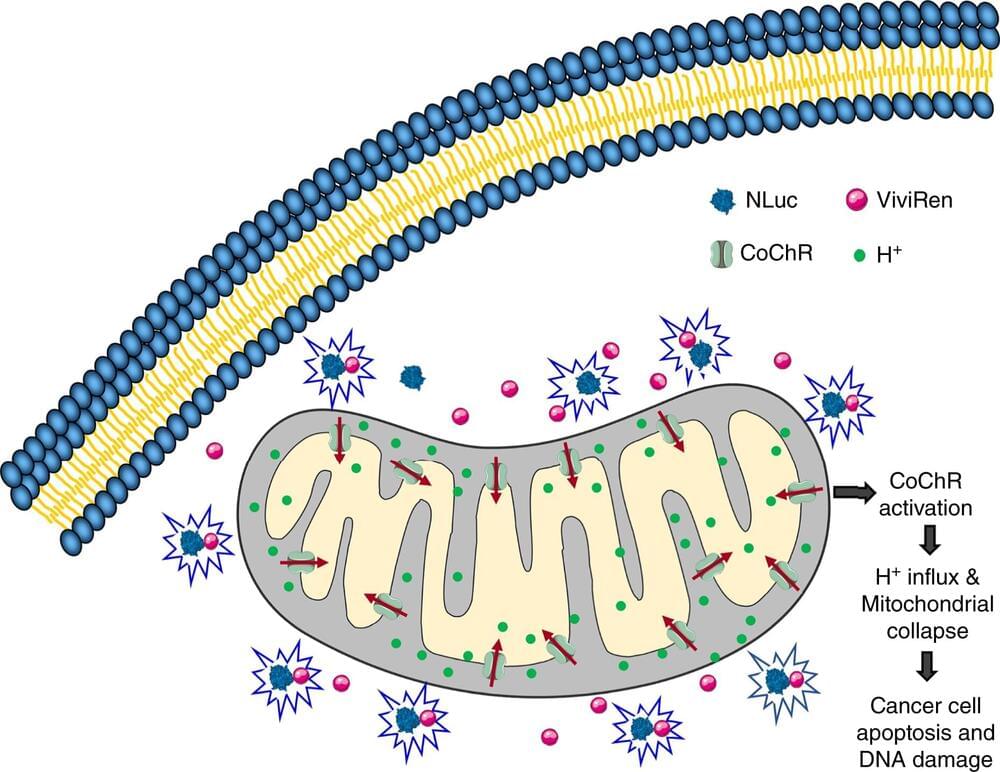
Researchers are shining a light on cancer cells’ energy centers—literally—to damage these power sources and trigger widespread cancer cell death. In a new study, scientists combined strategies to deliver energy-disrupting gene therapy using nanoparticles manufactured to zero in only on cancer cells. Experiments showed the targeted therapy is effective at shrinking glioblastoma brain tumors and aggressive breast cancer tumors in mice.
The research team overcame a significant challenge to break up structures inside these cellular energy centers, called mitochondria, with a technique that induces light-activated electrical currents inside the cell. They named the technology mLumiOpto.
“We disrupt the membrane, so mitochondria cannot work functionally to produce energy or work as a signaling hub. This causes programmed cell death followed by DNA damage—our investigations showed these two mechanisms are involved and kill the cancer cells,” said co-lead author Lufang Zhou, professor of biomedical engineering and surgery at The Ohio State University. “This is how the technology works by design.”

A research team from the Chinese Academy of Sciences (CAS) and BGI Research has unveiled the complex mechanisms through which immunoglobulins impact the aging process, a discovery that could transform our understanding of aging.
This research, published in Cell on November 4, not only charts a high-precision map of aging across various organs but also reveals the dual-edged sword of immunoglobulins in systemic aging.
The quest for systemic biomarkers and key drivers of aging has been a long-standing puzzle in the field of gerontology. This study, a collaborative effort between Guanghui Liu’s team from the Institute of Zoology (IOZ) of CAS, Ying Gu’s team from BGI Research, Weiqi’s Zhang team from the Beijing Institute of Genomics of CAS, and Jing Qu’s team also from IOZ, has provided compelling answers.
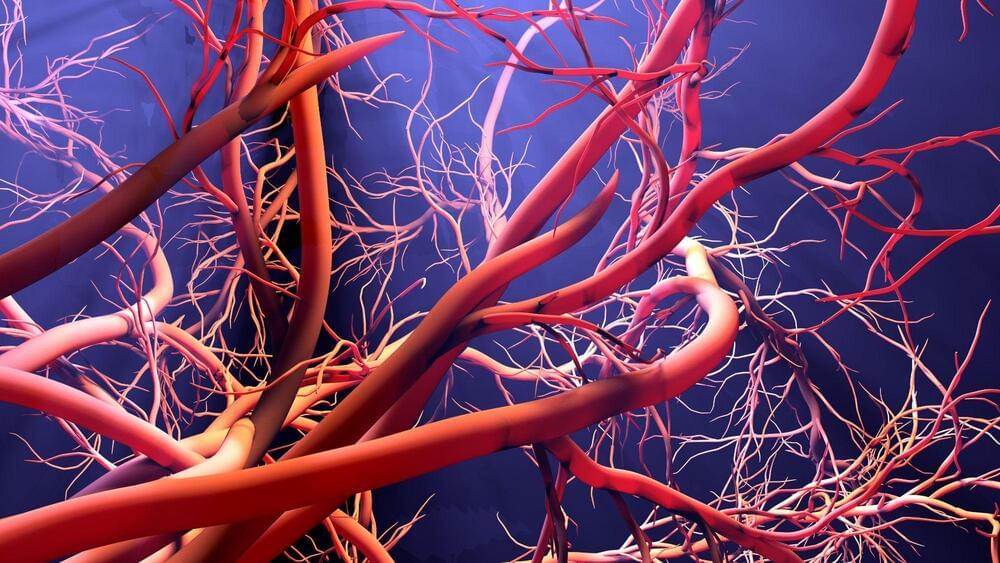
A recent study published in the journal Aging by Julia Michalkiewicz, Tung D. Nguyen, and Monica Y. Lee from the University of Illinois at Chicago College of Medicine underscores the essential role of the protein Nucleoporin93 (Nup93) in preserving blood vessel health during aging. The authors discuss emerging research that identifies Nup93 as a potential therapeutic target for preventing or mitigating aging-related conditions such as heart disease and stroke.
Cardiovascular diseases remain the leading causes of death worldwide, with aging identified as a major risk factor. Vascular health declines as endothelial cells (EC)—the protective lining of blood vessels—lose their functionality with age. This deterioration leads to inflammation, arterial stiffening, and reduced blood flow, significantly increasing the risk of life-threatening diseases. The authors underscore the urgent need to uncover the molecular mechanisms driving these changes.
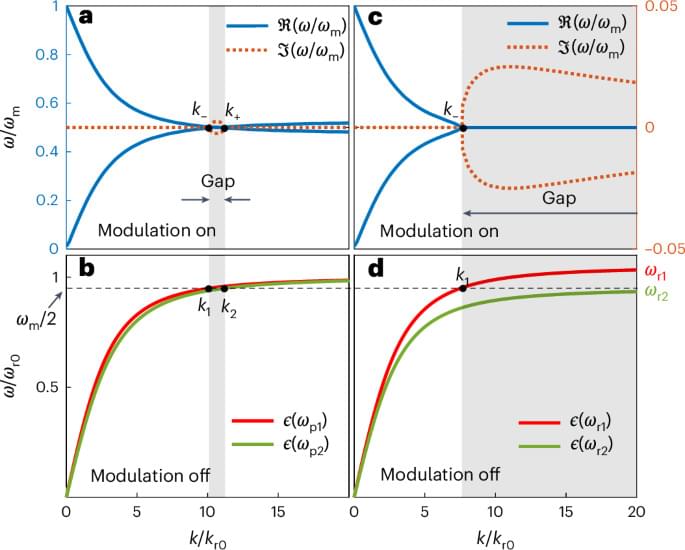
The size and strength of the momentum bandgap improve as the quality factor of the metasurface increases. Figure 3f shows that metasurfaces with a higher Q-factor provide wider momentum bandgaps for surface waves with larger amplification rates, assuming the same modulation function. In comparison, the metasurface discussed in Fig. 3b–e has a quality factor of Q = 2.44. Moreover, for sufficiently large Q-factors (Q ≥ 9.75), a second momentum bandgap opens inside the light cone, that is, for propagating waves. The size of the second bandgap grows with the quality factor of the metasurface because resonances with longer lifetimes suffer from smaller radiation losses and require weaker modulation to maintain the same amplification rate. When the quality factor takes sufficiently large values, the two bandgaps merge and the metasurface can amplify incident waves with all possible momenta k ∣ ∣ (see Fig. 3f).
We place a dipole emitter above the metasurface to demonstrate this infinite momentum bandgap (see Fig. 3g). The dipole radiation includes a wide spectrum of momenta, as shown in the upper panel of the figure. Once the temporal modulation of the metasurface is on, waves with all different momenta are amplified and radiated in the specular and retro-directions with respect to the source; see the lower panel in Fig. 3g. This leads to interesting possibilities such as amplified emission and lasing of light from a radiation source6. In contrast to the idea suggested in ref. 6, due to the substantially enhanced bandgap, it is possible here to amplify emission with a large and, in principle, tunable spectrum of wavenumbers. This provides opportunities for beam shaping of the amplified signal and for creating perfect lenses31. Indeed, the evanescent wave content of the source radiation can be reconstructed effectively thanks to the amplification of the wide range of k ∣ ∣. In Supplementary Section 5, we demonstrate that evanescent and propagating wave components of the radiating dipole are amplified by the metasurface in reflection and transmission regimes.
To provide a feasible optical realization of the resonant PTC, we consider a penetrable metasurface surrounded by air and consisting of dielectric nanospheres that are made of a material with a time-varying permittivity (see Fig. 4a). Each nanosphere effectively behaves as an LC resonator as it supports Mie resonances32. For simplicity, we initially ignore material dispersion. The permittivity associated with each nanosphere reads \(\varepsilon (t)=1+{\chi }_{0}[1+m\cos ({\omega }_{{\rm{m}}}t)]\). Varying the permittivity in time modulates the Mie resonance frequencies of the nanospheres (see Fig. 2b). In the following, we rely on the T-matrix method to study the optical response from such a metasurface33 (see Methods and Supplementary Section 6 for details).
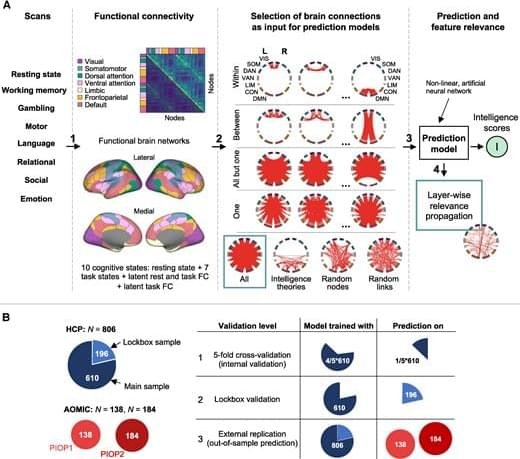
Neuroscientific research on human behavior and cognition has methodologically moved from unimodal explanatory approaches to machine learning-based predictive modeling (1). This implies a shift from standard approaches testing for associations between behavior and single neurobiological variables within one sample (unimodal explanatory research) to the identification of relationships between behavior and multiple neurobiological variables to forecast behavior of unseen individuals across samples (multimodal predictive research) (2). Modern machine learning techniques can learn such general relations in neural data (2, 3) and have consequently become increasingly prominent also in research on fundamental psychological constructs like intelligence (4).
Intelligence captures the general cognitive ability level of an individual person and predicts crucial life outcomes, such as academic achievement, health, and longevity (5, 6). Multiple psychometrical theories about the underlying conceptual structure of intelligence have been proposed. For example, Spearman (7) noticed that a person’s performance on different cognitive tasks is positively correlated and suggested that this “positive manifold” results from an underlying common factor—general intelligence (g). A decomposition of the g-factor into fluid (gF) and crystallized (gC) components was later proposed by Cattell (8, 9). While fluid intelligence is assumed to mainly consist of inductive and deductive reasoning abilities that are rather independent of prior knowledge and cultural influences, crystallized intelligence reflects the ability to apply acquired knowledge and thus depends on experience and culture (10).
Neurobiological correlates of intelligence differences were identified in brain structure (11) and brain function (12). However, rather than disclose a single “intelligence brain region”, meta-analyses and systematic reviews suggest the involvement of a distributed brain network (13–15), thus paving the way for proposals of whole-brain structural and functional connectivity (FC) underlying intelligence (16, 17). While the great majority of such studies used an explanatory approach, recently, an increasing number of machine learning-based techniques were developed and applied to predict intelligence from brain features (4, 18, 19). Although intrinsic FC measured during the (task-free) resting state has enabled robust prediction of intelligence (19), prediction performance can be boosted by measuring connectivity during task performance (18, 20).
The Call is still open on senescence in brain aging and Alzheimers disease!
Submit your paper today! 📩
Understanding Senescence in Brain Aging and Alzheimer’s Disease
Guest Editors Drs. Julie Andersen and Darren Baker, Associate Editor Dr. Anna Csiszar and Editor-in-Chief Dr. Zoltan Ungvari, and the editorial team of GeroScience (Journal of the American Aging Association; 2018 Impact Factor: 6.44) invite submission of original research articles, opinion papers and review articles related to research focused on understanding the role of senescence in brain aging and in Alzheimer’s disease. Senescent cells accumulate in aging and pathological conditions associated with accelerated aging. While earlier investigations focused on cellular senescence in tissues and cells outside of the brain (e.g. adipose tissue, dermal fibroblasts, cells of the cardiovascular system), more recent studies started to explore the role of senescent cells in age-related decline of brain function and the pathogenesis of neurodegenerative disease and vascular cognitive impairment. This call-for-papers is aimed at providing a platform for the dissemination of critical novel ideas related to the functional and physiological consequences of senescence in diverse brain cell types (e.g., oligodendrocytes, pericytes, astrocytes, endothelial cells, microglia, neural stem cells), with the ultimate goal to identify novel targets for treatment and prevention Alzheimer’s disease, Parkinson’s disease and vascular cognitive impairment. We welcome manuscripts focusing on senescent-cell-targeting mouse models, the role of paracrine senescence, senescence pathways in terminally differentiated neurons, the pleiotropic effects of systemic senescence, the role of senescence in neuroinflammation and the protective effects of senolytic therapies. We are especially interested in manuscripts exploring the causal role of molecular mechanisms of aging in induction of cellular senescence as well as links between lifestyle (e.g., diet, exercise, smoking), medical treatments (e.g. cancer treatments), exposure environmental toxicants and cellular senescence in the brain. We encourage submission of manuscripts on developing innovative strategies to identify and target senescent cells for prevention/treatment of age-related diseases of the brain. Authors are also encouraged to submit manuscripts focusing on translational aspects of senescence research.
All manuscripts accepted from this Call for Papers will be included in a unique online article collection to further highlight the importance of this topic. All manuscripts should be submitted online here: https://www.editorialmanager.com/jaaa/default.aspx.